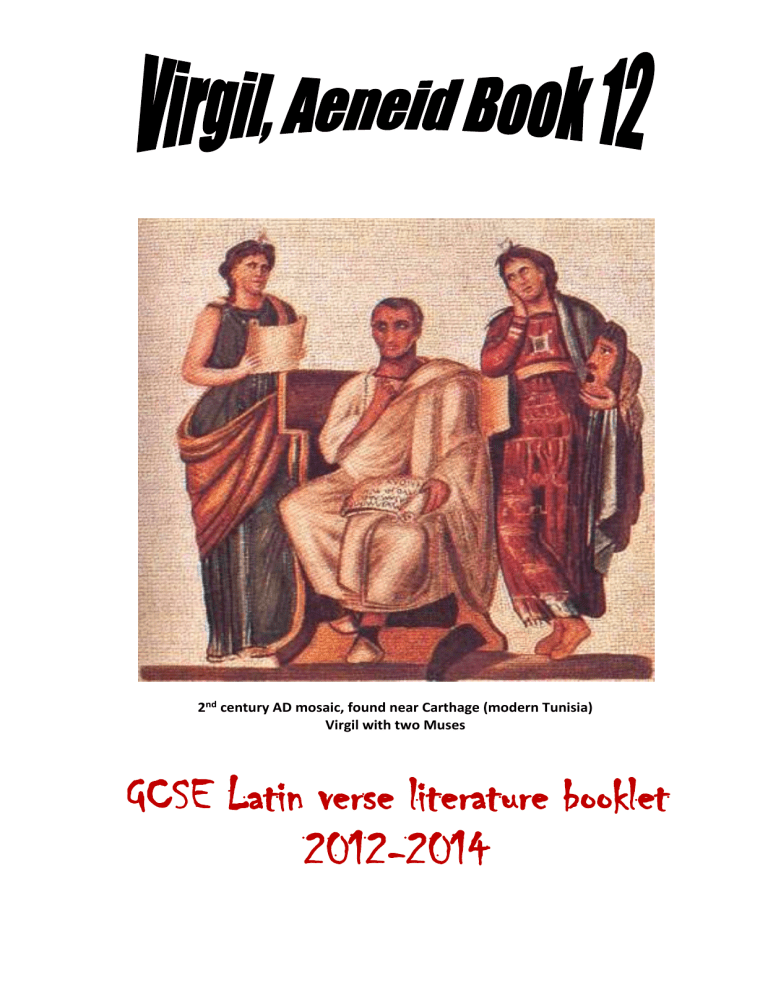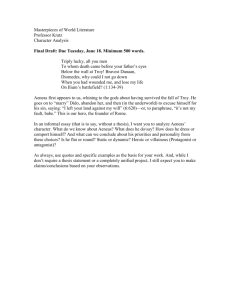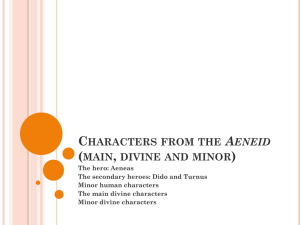PJT Doc - Worth School VLE

2 nd century AD mosaic, found near Carthage (modern Tunisia)
Virgil with two Muses
GCSE Latin verse literature booklet
2012-2014
Summary of prescribed text (including English section)
Aeneas and Turnus throw their spears without effect and join in close combat. Turnus strikes Aeneas with his sword, but it shatters - in his hurry he had mistakenly taken his charioteer’s sword.
[Aeneas chases Turnus, and as they pass the stump of an olive tree sacred to Faunus Aeneas tries to retrieve his spear which is sticking in the root. Faunus prevents him from pulling it out, while Juturna gives Turnus his own sword. Venus promptly restores Aeneas’ spear, and they stand again facing each other. In Olympus Jupiter orders Juno to stop interfering against the Trojans. She agrees, but begs that the Latins may keep their language and dress, and not become Trojans; that Rome may be great because of Italian virtues. Jupiter agrees and promises that the Romans especially will worship Juno.
Jupiter sends one of the Furies down to the battlefield, in the shape of an owl, in order to terrify Turnus, and to convince Juturna to withdraw.]
Aeneas threatens Turnus, who replies that he is only afraid of the gods. He tries to throw a huge rock at
Aeneas, but his strength fails him; he is like a man in a dream. Aeneas hurls his spear and wounds
Turnus in the thigh. Turnus begs for mercy, and Aeneas is on the point of granting it when he catches sight of Pallas’ sword-belt which Turnus is wearing. In fury and anger he kills his suppliant enemy.
Overview
Book 12 develops steadily towards the tragic intensity and inevitability of Turnus’ final defeat, opponent of Roman destiny (In Book 1 Jupiter told Venus that Aeneas was destined to settle in Italy, and that
Rome would be founded a few centuries later). Book 12 has close similarities with the tone of Greek tragedy. Virgil was influenced by Homer’s Greek poems (the Iliad and Odyssey) for its narrative of the conflict (eg single combat / indecisive combat at first with divine interventions on both sides).
Aeneas
Presented by Virgil as the archetypal ‘Roman’ (Trojan) hero and ancestor.
Previously reluctant to enter battle, Aeneas can fight ruthlessly and savagely.
Generally displays a calmer mood and a moderate, reasonable attitude.
Enters battle in a mood of passion and anger, with the same violent fury which he had shown after
Pallas’ death (10.513 f).
Wounding of the bemused Turnus follows quickly, and as he begs for mercy the reader may well anticipate that Aeneas is the sort of man who will grant it. He is indeed on the point of doing so, but the sight of Pallas’ belt causes in him an upsurge of fury and in vengeance he kills his enemy.
Should he have done so? Virgil has posed this question.
Turnus
Impetuous, courageous and doughty warrior.
Juturna’s intervention (giving him his sword) postpones his hour of reckoning.
As combat draws nearer, Turnus suddenly loses his self-confidence.
Reminiscences of Dido’s tragic helplessness (Book 4) deepen sympathy for the victim of forces which have now become irresistible (ie fate and the destined foundation of Rome).
Glossary of names and places
Aeneas Trojan prince, son of Anchises and Venus. Ancestor of Romans.
Embodies characteristics valued by Romans: piety (responsibility, especially to gods), courage, skill as warrior. Leads many survivors of Trojan War across seas and through adversity to Italy.
Anchises Aeneas’ father.
Appeninus Appenines, main mountain range in Italy.
Athos Mt Athos in northern Greece.
Ausonians Italians.
Daunus King of Apulia, Turnus’ father.
Eryx Mountain in north west Sicily.
Eurus East wind.
Evander King (from Greece) who founded Italian city of Pallanteum.
Juturna Turnus’ sister, a nymph.
Lavinia King Latinus’ daughter. Betrothed to Turnus, then Aeneas.
Latinus King of the Laurentians (in Italy). Encourages him to marry his daughter, Lavinia.
Metiscus Turnus’ charioteer.
Pallas Evander’s son. Youthful warrior and Aeneas’ ally, killed in battle by Turnus.
Rutulians Ancient tribe in Latium (area of Italy), commanded by Turnus.
Sila Mountain range in southern Italy.
Taburnus Mountain range in Italy.
Teucrians Trojans (so called after Teucer, ancestral King of Troy).
Turnus King of Rutulians and Aeneas’ main rival in Italy.
Angered by Aeneas’ pursuit of Lavinia. Killed by Aeneas in revenge for Pallas’ death.
Umbria Area in central Italy, north of Rome.
Vulcan Venus' husband and fire god. Crafts armour for Aeneas in Book 8, at instigation of Venus.
Latin text at pater Aeneas audito nomine Turni deserit et muros et summas deserit arces praecipitatque moras omnis, opera omnia rumpit laetitia exsultans horrendumque intonat armis: 700 quantus Athos aut quantus Eryx aut ipse coruscis cum fremit ilicibus quantus gaudetque nivali vertice se attollens pater Appenninus ad auras. iam vero et Rutuli certatim et Troes et omnes convertere oculos Itali, quique alta tenebant 705 moenia quique imos pulsabant ariete muros, armaque deposuere umeris. stupet ipse Latinus ingentis, genitos diversis partibus orbis, inter se coiisse viros et cernere ferro. atque illi, ut vacuo patuerunt aequore campi, 710 procursu rapido coniectis eminus hastis invadunt Martem clipeis atque aere sonoro.
dat gemitum tellus; tum crebros ensibus ictus congeminant, fors et virtus miscetur in unum. ac velut ingenti Sila summove Taburno 715 cum duo conversis inimica in proelia tauri frontibus incurrunt, pavidi cessere magistri, stat pecus omne metu mutum, mussantque iuvencae quis nemori imperitet, quem tota armenta sequantur; illi inter sese multa vi vulnera miscent 720 cornuaque obnixi infigunt et sanguine largo colla armosque lavant, gemitu nemus omne remugit: non aliter Tros Aeneas et Daunius heros concurrunt clipeis, ingens fragor aethera complet.
Iuppiter ipse duas aequato examine lances 725 sustinet et fata imponit diversa duorum, quem damnet labor et quo vergat pondere letum. emicat hic impune putans et corpore toto
o alte sublatum consurgit Turnus in ensem et ferit; exclamant Troes trepidique Latini, 730 arrectaeque amborum acies. at perfidus ensis frangitur in medioque ardentem deserit ictu, ni fuga subsidio subeat. fugit ocior Euro ut capulum ignotum dextramque aspexit inermem. fama est praecipitem, cum prima in proelia iunctos 735 conscendebat equos, patrio mucrone relicto, dum trepidat, ferrum aurigae rapuisse Metisci; idque diu, dum terga dabant palantia Teucri, suffecit; postquam arma dei ad Volcania ventum est, mortalis mucro glacies ceu futtilis ictu 740 dissiluit, fulva resplendent fragmina harena. ergo amens diversa fuga petit aequora Turnus et nunc huc, inde huc incertos implicat orbis; undique enim densa Teucri inclusere corona
atque hinc vasta palus, hinc ardua moenia cingunt. 745 nec minus Aeneas, quamquam tardata sagitta interdum genua impediunt cursumque recusant, insequitur trepidique pedem pede fervidus urget: inclusum veluti si quando flumine nactus cervum aut puniceae saeptum formidine pennae 750 venator cursu canis et latratibus instat; ille autem insidiis et ripa territus alta mille fugit refugitque vias, at vividus Umber haeret hians, iam iamque tenet similisque tenenti increpuit malis morsuque elusus inani est; 755 tum vero exoritur clamor ripaeque lacusque responsant circa et caelum tonat omne tumultu. ille simul fugiens Rutulos simul increpat omnis nomine quemque vocans notumque efflagitat ensem.
Aeneas mortem contra praesensque minatur 760
exitium, si quisquam adeat, terretque trementis excisurum urbem minitans et saucius instat. quinque orbis explent cursu totidemque retexunt huc illuc; neque enim levia aut ludicra petuntur praemia, sed Turni de vita et sanguine certant. 765
Break in Latin text, so read Penguin translation for lines 766-886.
Aeneas instat contra telumque coruscate ingens arboreum, et saevo sic pectore fatur:
'quae nunc deinde mora est? aut quid iam, Turne, retractas? non cursu, saevis certandum est comminus armis. 890 verte omnis tete in facies et contrahe quidquid sive animis sive arte vales; opta ardua pennies astra sequi clausumque cava te condere terra.' ille caput quassans: 'non me tua fervida terrent dicta, ferox; di me terrent et Iuppiter hostis.' 895 nec plura effatus saxum circumspicit ingens,
saxum antiquum ingens, campo quod forte iacebat, limes agro positus litem ut discerneret arvis. vix illum lecti bis sex cervice subirent, qualia nunc hominum producit corpora tellus; 900 ille manu raptum trepida torquebat in hostem altior insurgens et cursu concitus heros. sed neque currentem se nec cognoscit euntem tollentemve manu saxumve immane moventem; genua labant, gelidus concrevit frigore sanguis. 905 tum lapis ipse viri vacuum per inane volutus nec spatium evasit totum neque pertulit ictum. ac velut in somnis, oculos ubi languida pressit nocte quies, nequiquam avidos extendere cursus velle videmur et in mediis conatibus aegri 910 succidimus; non lingua valet, non corpore notae sufficiunt vires nec vox aut verba sequuntur:
sic Turno, quacumque viam virtute petivit, successum dea dira negat. tum pectore sensus vertuntur varii; Rutulos aspectat et urbem 915 cunctaturque metu letumque instare tremescit, nec quo se eripiat, nec qua vi tendat in hostem, nec currus usquam videt aurigamve sororem. cunctanti telum Aeneas fatale coruscat, sortitus fortunam oculis, et corpore toto 920 eminus intorquet. murali concita numquam tormento sic saxa fremunt nec fulmine tanti dissultant crepitus. volat atri turbinis instar exitium dirum hasta ferens orasque recludit loricae et clipei extremos septemplicis orbis; 925 per medium stridens transit femur. incidit ictus ingens ad terram duplicato poplite Turnus. consurgunt gemitu Rutuli totusque remugit
mons circum et vocem late nemora alta remittunt. ille humilis supplex oculos dextramque precantem 930 protendens 'equidem merui nec deprecor' inquit;
'utere sorte tua. miseri te si qua parentis tangere cura potest, oro (fuit et tibi talis
Anchises genitor) Dauni miserere senectae et me, seu corpus spoliatum lumine mavis, 935 redde meis. vicisti et victum tendere palmas
Ausonii videre; tua est Lavinia coniunx, ulterius ne tende odiis.' stetit acer in armis
Aeneas volvens oculos dextramque repressit; et iam iamque magis cunctantem flectere sermo 940 coeperat, infelix umero cum apparuit alto balteus et notis fulserunt cingula bullis
Pallantis pueri, victum quem vulnere Turnus straverat atque umeris inimicum insigne gerebat.
ille, oculis postquam saevi monimenta doloris 945 exuviasque hausit, furiis accensus et ira terribilis: 'tune hinc spoliis indute meorum eripiare mihi? Pallas te hoc vulnere, Pallas immolat et poenam scelerato ex sanguine sumit.' hoc dicens ferrum adverso sub pectore condit 950 fervidus; ast illi solvuntur frigore membra vitaque cum gemitu fugit indignata sub umbras.
Translation
Lines 697 - 727
But Father Aeneas, having heard Turnus’ name, abandons the walls, abandons the lofty citadels, flings aside all delays, breaks off all tasks and, rejoicing with happiness, thunders terribly in his arms; vast as
Athos, vast as Eryx or vast as Father Appeninus himself when he roars with his quivering oaks and rejoices as he lifts his snowy head to the breezes. Now indeed both the Rutulians and Trojans and all the Italians eagerly turned their eyes, both those who held the high walls and those who were battering the walls below with their ram – and they took off the armour from their shoulders. Latinus himself is amazed that these huge men, born in distant parts of the world, have come together to decide the issue by the sword.
And as soon as the plains lay open with empty ground, having thrown their spears at a distance, with a rapid charge they rush to battle with their shields and clanging bronze. The earth groans; then they redouble their frequent sword blows; chance and courage are mixed together. And just as on huge Sila or on top of Taburnus when two bulls charge with meeting brows in hostile battle; in terror the herdsmen withdraw; all the herd stands mute with fear and the heifers hesitate over who will rule the forest, whom the whole herd will follow; with much force they exchange wounds, gore with their butting horns and bathe necks and shoulders with streaming blood; all the forest resounds with groaning. Likewise Trojan Aeneas and the Daunian hero clash with shields, and a mighty crash fills the sky. Jupiter himself holds up two (scale) pans in even balance and puts in them the diverse fates of the two men, (to see) whom the struggle condemns and with which weight death sinks.
Line 728 - 765
Next Turnus leaps forth, thinking it safe, and with his body at full height rises on his uplifted sword and strikes: the Trojans and expectant Latins cry aloud, both battle lines excited. But the treacherous sword breaks and in mid stroke fails fiery Turnus, and flight does not come to help. He flees swifter than the
East wind, as soon as he caught sight of an unknown hilt in his unarmed (right) hand. The story is that while he was anxiously hurrying headlong, when he mounted his yoked horses for the first battle, he left his father’s blade behind and snatched the sword of Metiscus his charioteer. And for a long time that was strong enough, while the straggling Trojans turned their backs; after it faced the arms of the god
Vulcan, the mortal blade, like brittle ice, snapped at the stroke; the fragments glitter on the yellow sand.
Therefore Turnus, mad for flight, makes for different parts of the plain and now here, now there entwines wavering circles; for on all sides the Teucrians (Trojans) enclosed him in a dense circle, and here a vast swamp, there lofty walls surround him.
No less does Aeneas, although sometimes his knees hampered by the arrow-wound impede him and deny his speed, pursue and eagerly press on his trembling prey foot to foot. As when a hunting hound which has found a deer trapped by a river or hemmed in by terror of crimson feathers, presses on with running and barking; but the deer, terrified by the snares and high bank, flees and flees again in a thousand directions; but the eager Umbrian (hound) clings with jaws gaping, now and now he seizes him and, as if seizing him, has snapped with his jaws, and is baffled by an empty bite. Then indeed the noise rises, banks and lakes echo around and the whole sky thunders with the din. Even as he flees, Turnus reproaches all the Rutulians, calling each by name, and demands his familiar sword. Aeneas in turn threatens death and instant ruin if anyone comes forward, and terrifies his trembling (foes), threatening to destroy the city, and though wounded presses on. They complete five circles at speed and unweave just as many this way and that; for they seek no trivial or sportive prize, but they are striving for Turnus’ life and blood.
Lines 887-918
Aeneas presses on confronting him and shakes his huge tree-like spear, and with a furious heart speaks thus: “What delay is there now after that? Or why are you now drawing back, Turnus? We must contend (with each other), not in racing (but) at close quarters with fierce arms. Turn yourself into all
(different) shapes, and gather all your strength of courage or skill; choose to follow the lofty stars on wings, or to hide yourself shut up in the hollow earth.” Turnus (replied), shaking his head, “Your fiery words do not frighten me, fierce as you are; the gods, and Jupiter as my enemy, frighten me.” He said no more but looks round and sees a huge rock, an ancient, enormous rock which by chance was lying on the plain, put there as a field boundary, to decide a dispute about land. Scarcely could twelve picked men, men of such build as the earth now produces, have lifted the rock on their necks; the hero (Turnus) seized it in his trembling hand and hurled it at his enemy, rising up higher and speeding along as he ran.
But he does not realise (what he is doing), neither running, nor going, nor his hands picking up or moving the enormous rock: his knees falter, his blood ran cold with the chill. Then the man’s stone itself rolled through the empty space, but did not pass beyond the whole space or carry home its blow. And just as in sleep, when at night drowsy rest has weighed down our eyes, we seem to want in vain to press on our eager course [i.e. run further], and in the midst of our efforts sink down sick; our tongue lacks power, our familiar strength is not sufficient for our body, and our voice and words do not follow. So to
Turnus, wherever he sought a way with courage, the dreadful goddess denies any success.
Then varying feelings wheel round in his breast: he looks at the Rutulians and the city, hesitates in his fear and begins to tremble at the spear pressing upon him, sees no way of escape, nor any strength with which to strive against his enemy, and sees no chariot anywhere nor his sister the charioteer.
Lines 919-952
As he hesitates Aeneas shakes his fatal spear at him, seeking with his eyes a lucky spot, and hurls it from a distance with all his strength. Never do rocks hurled from a siege-engine roar so loudly nor break apart with such a thundering crash [lit. crashes break apart with such thunder]. The spear flies like a black whirlwind bringing fearful death, and pierces the edge of his breastplate and the outermost circle of his sevenfold shield; whistling it passes through the middle of his thigh. Having been struck, huge
Turnus fell to the ground, with his knee bent.
The Rutulians rise with a groan and the whole mountain echoes around, and the high forests send back the sound far and wide. Humble and submissive, uplifting his eyes and pleading right hand, he said, “In truth I have deserved this, and I do not beg for mercy. Make use of your good fortune. If any care for my unhappy father can touch you, I beg
(Anchises was such a father to you), have pity on Daunus’ old age, and return me to my people or, if you prefer, my corpse robbed of life. You have won, and the Ausonians have seen me stretch out my hands in defeat; Lavinia is your wife; do not press on further in hatred.” Aeneas stood fierce in his arms, rolling his eyes, and held back his right hand; and now more and more as he hesitated his (Turnus’) speech began to sway him, when unluckily there appeared high on his shoulder a sword-belt, and the belt gleamed with the familiar studs of the boy Pallas, whom Turnus had defeated and laid low with a wound, and he was wearing his enemy’s badge on his shoulders. After Aeneas drank in with his eyes the spoil which was a reminder of cruel sorrow, fired with fury and terrible in his anger (he said): “Are you to escape me now, wearing the spoils of one dear to me? Pallas sacrifices you with this wound, Pallas takes revenge from your guilty blood.” Whilst saying this, glowing with anger he buries his sword in his enemy’s breast.
But Turnus’ limbs are loosened with a chill, and with a groan his life fled indignant to the shades below.
Aeneas defeats Turnus: Luca Giordano (1634-1705).
Vocabulary: lines 697 - 718 desero, deserere, deserui, desertum forsake, abandon, desert arx, arcis (f) citadel, height praecipito, praecipitare, praecipitavi, praecipitatum fling aside opus, operis (n) work, labour, task laetitia, laetitiae (f) joy, gladness exsulto, exsultare, exsultavi, exsultatum exult, rejoice horrendum (adv) dreadfully intono, intonare, intonavi thunder coruscus, -a, -um quivering, tossing fremo, fremere, fremui, fremitum growl, roar ilex, ilicis (f) oak tree nivalis, -e snowy vertex, verticis (m) head, top, crest attollo, attollere raise up aura, aurae (f) breeze certatim in rivalry, eagerly moenia, moenium (n pl) defensive walls, ramparts imus, -a, -um lowest, deepest, bottom of aries, arietis (m) (battering) ram umerus, umeri (m) shoulder stupeo, stupere, stupui be amazed, stand in amazement gigno, gignere, genui, genitum bring forth (genitus = born) orbis, orbis (m) the world coeo, coire, coii, coitum come together, meet cerno, cernere, crevi, cretum decide an issue, perceive vacuus, -a, -um empty pateo, patere, patui lie open aequor, aequoris (n) level surface, plain, sea campus, campi (m) plain procursus, procursus (m) charge, sallying forth, onset eminus (adv) at / from a distance hasta, hastae (f) spear clipeus, clipei (m) shield aes, aeris (n) bronze sonorus, -a, -um sounding, noisy gemitus, gemitus (m) groan, sigh tellus, telluris (f) earth, ground creber, crebra, crebrum thick, close, frequent ensis, ensis (m) sword ictus, ictus (m) blow, stroke congemino, congeminare, congeminavi, congeminatum redouble fors (f) chance misceo, miscere, miscui, mixtum mix, mingle velut just as, even as frons, frontis (f) forehead, brow pavidus, -a, -um trembling, terror-stricken pecus, pecoris (n) herd, flock metus, metus (m) fear musso, mussare, mussavi, musatum mutter, doubt, hesitate iuvenca, iuvencae (f) young cow, heifer
Vocabulary: lines 719 - 741 nemus, nemoris (n) wood, forest armentum, -i (n) herd vis (f) strength, force cornu, cornus (n) horn obnitor, obniti, obnixus sum push hard, lean / strive against infigo, infigere, infixi, infixum fix in, drive in largus, -a, -um abundant, plenteous collum, colli (n) neck lavo, lavare, lavi, lavatum bathe, wash remugio, remugire re-echo with bellowing, resound aliter (adv) otherwise fragor, fragoris (m) crash, noise aether, aetheris (m) upper air, heaven, sky compleo, complere, complevi, completum fill up aequato examine in even poise / balance lanx, lancis (f) pan, scale damno, damnare, damnavi, damnatum condemn vergo, vergere bend, sink, incline pondus, ponderis (n) weight letum, leti (n) death emico, emicare, emicui, emicatum leap forth impune (adv) without punishment, safe, unharmed arrigo, arrigere, arrexi, arrectum raised, roused (arrectus = excited) ambo, ambae, ambo both acies, aciei (f) battle line perfidus, -a, -um treacherous, faithless, false frango, frangere, fregi, fractum break ardens burning, blazing, fiery ni = nisi if not, unless fuga, fuage (f) flight subsidium, subsidii (n) aid, help subeo, subire, subii, subitum come up to ocior (comp adj) swifter capulus, capuli (m) hilt of sword dextra, dextrae (f) right hand aspicio, aspicere, aspexi, aspectum look at, see inermis, -e unarmed fama, famae (f) fame, talk, rumour, report praeceps, praecipitis headlong conscendo, conscendere, conscendi, conscensum climb up, mount mucro, mucronis (m) (edge of) sword auriga, aurigae (f) charioteer tergum, tergi (n) back palor, palari, palatus sum straggle sufficio, sufficere, suffeci, suffectum be strong glacies, glaciei (f) ice ceu as, like as futtilis, -e useless, brittle dissilio, dissilere, dissilui leap / snap apart fulvus, -a, -um yellow, tawny
Vocabulary: lines 741 -760 resplendeo, resplendere shine brightly fragmen, fragminis (n) fragment harena, harenae (f) sand ergo therefore amens, amentis mad, frantic fuga, fugae (f) flight inde then huc... huc here... there implico, implicare, implicavi, implicatum entwine undique from / on all sides include, includere, inclusi, inclusum enclose, hem in corona, coronae (f) ring, circle hinc... hinc here... there palus, paludis (f) swamp, marsh arduus, -a, -um high, towering cingo, cingere, cinxi, cinctum surround tardo, tardare, tardavi, tardatum hinder, delay, make slow sagitta, sagittae (f) arrow interdum sometimes genu, genus, (n) knee cursus, cursus (m) speed, course, running recuso, recusare, recusavi, recusatum deny, refuse fervidus, -a, -um eager, impetuous urgueo, urguere, ursi press (hard) on, overwhelm nancicsor, nancisci, nactus get, obtain, find cervus, cervi (m) stag, deer aut or puniceus, -a, -um scarlet, crimson saepio, saepire, saepsi, saeptum hedge / hem in formido, formidinis (f) fear, dread, terror penna, pennae (f) feather venator, venatoris (m) hunter, hound insto, instare, institi, instatum press (hard) on insidiae, insidiarum (f pl) snare, trap ripa, ripae (f) (river) bank mille a thousand haereo, haerere, haesi, haesum cling, stay close hio, hiare, hiavi, hiatum gape (hians = with gaping jaws) increpo, increpare, increpui, increpitum snap with jaws, taunt, reproach mala, malae (f) jaw morsus, morsus (m) bite, grip eludo, eludere, elusi, elusum baffle inanis, -e empty exorior, exoriri, ortus sum rise lacus, lacus (m) lake tono, tonare, tonui, tonitum thunder tumultus, tumultus (m) din efflagito, efflagitare, efflagitavi, efflagitatum demand praesens, praesentis instant, immediate minor, minari, minatus sum threaten
Vocabulary: lines 761 - 765 exitium, exitii (n) destruction, ruin, death quisquam, quaequam, quidquam any, anyone tremo, tremere, tremui tremble, quiver excido, excidere, excidi, excisum destroy, raze minitor, minitari, minitatus sum threaten saucius, -a, -um wounded totidem just so many retexo, retexere, retexui, retextum unweave huc illuc this way and that levis, -e light, trivial ludicrus, -a, -um sportive, done in sport certo, certare, certavi, certatum contend, strive
Vocabulary: lines 887 - 905 insto, instare, institi, instatum press on conra confronting (him / Turnus) telum, teli (n) spear corusco, coruscare, coruscavi, coruscatum brandish, shake arboreus, -a, -um tree-like pectus, pectoris (n) breast, chest, heart for, fari, fatus sum speak, say comminus (adv) at close quarters, hand to hand tete you (strengthened form of te) facies, faciei (f) form, shape, appearance contraho, contrahere, contraxi, contractum draw / gather together quidquid facies all your strength sive... sive whether... or opto, optare, optavi, optatum choose, wish for, desire pinna, pinnae (f) wing astrum, astri (n) star claudo, claudere, clausi, clausum shut, close, hide cavus, -a, -um hollow condo, condere, condidi, conditum bury, hide quasso, quassare, quassavi, quassatum shake plus, pluris more effor, effari, effatus sum speak out, utter saxum, saxi (n) rock limes, limitis (m) boundary (stone) lis, litis (f) strife, dispute discerno, discernere, discrevi, discretum separate, decide, settle arvum, arvi (n) field, land vix with difficulty, scarcely lego, legere, legi, lectum choose, pick bis twice (bis sex = twelve) cervix, cervicis (f) neck torqueo, torquere, torsi, tortum hurl concitus, -a, um (participle from concieo) rushing immanis, -e enormous, huge labo, labare, labavi, labatum totter, falter, waver
Vocabulary: lines 905 - 932 gelidus, -a, -um icy cold, frozen, chilly concresco, concrescere, concrevi, concretum condense, congeal lapis, lapidis (m) stone volvo, volvere, volvi, volutum roll, turn about spatium, spatii (n) distance somnus, somni (m) sleep languidus, -a, -um faint, weary, drowsy premo, premere, pressi, pressum press (hard) upon, weigh down quies, quietis (f) rest, quiet nequiquam in vain avidus, -a, -um eager, greedy succido, succidere, succidi sink down, fall lingua, linguae (f) tongue sufficio, sufficere, suffeci, suffectum be strong enough, suffice quacumque wherever aspecto, aspectare, aspectavi, aspectatum look at cunctor, cunctari, cunctatus sum hesitate tremesco, tremescere begin to tremble
(se) eripio, eripere, eripui, ereptum snatch oneself away (i.e. escape) sortior, sortiri, sortitus sum seek intorqueo, intorquere, intorsi, intortum hurl at muralis, -e of a wall, for battering walls concieo, conciere, concivi, concitum hurl, whirl tormentum, tormenti (n) siege engine fulmen, fulminis (n) thunderbolt dissulto, dissultare leap apart crepitus, crepitus (m) crash volo, volare, volavi, volatum fly ater, atra, atrum black turbo, turbinis (m) whirlwind instar like ora, orae (f) edge recludo, recludere, reclusi, reclusum throw open reveal lorica, loricae (f) breastplate septemplex, septemplicis sevenfold (i.e. seven protective layers) strido, stridere whizz, whistle, whir femur, femoris (n) thigh incido, incidere, incidi, incasum fall (upon) duplicato poplite on bended knee consurgo, consurgere, consurrexi, consurrrectum rise up (together) remugio, remugire re-echo with bellowing, resound late far and wide (lit. widely) humilis, -e humble supplex, supplicis submissive precor, precari, precatus sum pray, beseech protendo, protendere, protendi, protensum stretch forth, extend equidem truly, indeed mereo, merere, merui, meritum deserve deprecor, deprecari, deprecatus sum beg utor, uti, usus sum make use of (+ ablative)
Vocabulary: lines 932 - 952 sors, sortis (m) fate, fortune tango, tangere, tetigi, tactum touch talis, -e such, of such a kind genitor, genitoris (m) father senecta, senectae (f) old age seu or spolio, spoliare, spoliavi, spoliatum despoil, strip, rob of lumen, luminis (n) light, life coniunx, coniugis (m/f) husband, wife ulterius further odium, odii (n) hatred acer, acris, acre fierce volvo, volvere, volvi, volutum roll oculus, oculi (m) eye reprimo, reprimere, repressi, repressum hold back, check flecto, flectere, flexi, flectum turn, sway, influence sermo, sermonis (n) speech balteus, baltei (m) sword-belt fulgeo, fulgere, fulsi shine, gleam cingulum, cinguli (n) belt bulla, bullae (f) boss, stud sterno, sternere, stravi, stratum lay low insigne, insignis (n) distinctive badge gero, gerere, gessi, gestum wear monimentum, monimenti (n) memorial dolor, doloris (m) sorrow, grief exuviae, exuviarum (f pl) spoils haurio, haurire, hausi, haustum drink in furia, furiae (f) violent rage, frenzy accendo, accendere, accendi, accensum set on fire, inflame spolium, spolii (n) spoil induo, induere, indui, indutum wear immolo, immolare, immolavi, immolatum sacrifice sumo, sumere, sumpsi, sumptum take, exact (penalty) condo, condere, condidi, conditum bury, plunge ast = at but, yet solvo, solvere, solvi, solutum loosen frigus, frigoris (n) cold, chill membrum, membri (n) limb umbra, umbrae (f) shade, shadow




